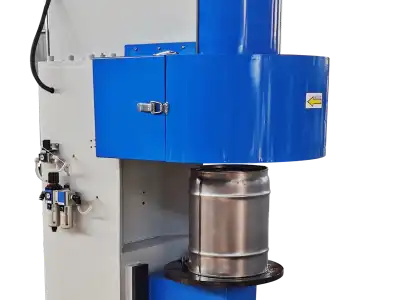Compatible Materials for Steel Drum Welding Machines
While steel is the primary material used in drum manufacturing, Steel Drum Automatic Welding Machines are capable of working with a variety of metals and alloys. Here's a breakdown of the materials commonly used:
1. Carbon Steel: Carbon steel is the most commonly used material for drum production due to its excellent combination of strength, durability, and cost-effectiveness. It provides reliable structural integrity, making it a popular choice for industries where robust and affordable drums are required. The material's versatility allows it to be used across a wide range of applications, from industrial storage to transportation.
2. Stainless Steel: Stainless steel is the go-to material for applications where corrosion resistance is paramount. Its ability to withstand harsh environmental conditions makes it ideal for industries like food processing, pharmaceuticals, and chemicals. Stainless steel drums maintain their integrity even when exposed to moisture, chemicals, and high temperatures, ensuring safety and longevity.
3. Galvanized Steel: Galvanized steel offers superior corrosion resistance compared to standard steel due to its protective zinc coating. This makes it an excellent option for outdoor storage or use in humid or saline environments. The added layer of zinc helps prevent rusting, extending the lifespan of the drum and reducing maintenance needs.
4. Aluminum: Aluminum drums are lightweight yet durable, making them the preferred choice in industries where weight is a critical factor. In addition to being highly resistant to corrosion, aluminum offers excellent impact resistance, which makes it suitable for both storage and transportation of goods. Its lightweight nature also contributes to lower shipping costs and easier handling.
5. Alloy Steels: Alloy steels are used in specialized applications where certain material properties, such as enhanced heat resistance or superior strength, are required. These steels are often alloyed with elements like chromium, nickel, or molybdenum to enhance their performance in demanding environments. Alloy steel drums are ideal for industries such as aerospace or automotive, where high-performance materials are essential.
The Steel Drum Automatic Welding Machine's versatility in handling these materials stems from its advanced technology and precise control systems. By adjusting parameters such as welding speed, current, and voltage, these machines can accommodate the unique properties of each material, ensuring optimal weld quality.
Factors Influencing Material Selection for Drum Welding
Choosing the right material for your drum welding project involves considering several factors:
1. Contents and Usage: The intended contents of the drum and its usage environment play a crucial role in material selection. Corrosive chemicals may require stainless steel, while food products might necessitate food-grade materials. In some cases, an automatic spot welding machine can be used to efficiently manufacture drums, ensuring precision and durability in the final product.
2. Regulatory Compliance: Certain industries have specific regulations regarding drum materials. For instance, the transportation of hazardous materials often requires UN-certified drums made from approved materials.
3. Cost Considerations: While stainless steel offers excellent properties, it comes at a higher cost. Carbon steel might be more economical for less demanding applications.
4. Weight Requirements: If weight is a concern, such as in transportation or handling, lighter materials like aluminum might be preferable.
5. Durability and Lifespan: Consider the expected lifespan of the drum and the wear and tear it will endure. Some materials offer better longevity in certain conditions.
The Steel Drum Automatic Welding Machine's adaptability shines in this context. Its programmable settings allow for quick adjustments to accommodate different materials, making it an invaluable asset for manufacturers dealing with diverse product lines.
Optimizing Welding Processes for Different Materials
To achieve the best results with an Steel Drum Automatic Welding Machine across various materials, consider these optimization strategies:
1. Proper Material Preparation: Ensure surfaces are clean and free from contaminants. For materials like aluminum, which forms an oxide layer quickly, proper cleaning is crucial for weld quality.
2. Welding Parameter Adjustment: Each material requires specific welding parameters. For instance, stainless steel typically needs lower heat input compared to carbon steel to prevent distortion.
3. Post-Weld Treatment: Some materials, particularly stainless steel, benefit from post-weld treatments to restore corrosion resistance in the heat-affected zone.
4. Quality Control Measures: Implement rigorous quality control processes, including visual inspection and non-destructive testing, to ensure weld integrity across different materials.
The Steel Drum Automatic Welding Machine's precision control allows for fine-tuning of these parameters, ensuring optimal results regardless of the material being welded. This level of control is particularly beneficial when working with more challenging materials like thin-gauge aluminum or high-strength alloy steels.
In conclusion, the versatility of steel drum welding machines, particularly the Steel Drum Automatic Welding Machine, extends far beyond just steel. From carbon and stainless steel to aluminum and specialized alloys, these machines can handle a wide range of materials with proper setup and optimization. This adaptability makes them an invaluable asset in various industries, from chemical processing to food manufacturing.
Understanding the nuances of material compatibility and welding optimization is crucial for maximizing the potential of your Steel Drum Automatic Welding Machine. By carefully considering material properties, intended use, and welding parameters, you can achieve high-quality, durable welds across a diverse range of drum materials.
If you're looking to enhance your drum manufacturing capabilities or need expert advice on selecting the right welding solutions for your specific materials, don't hesitate to reach out. Contact us at ry@china-ruilian.cn or visit our website at www.rlseamwelding.com for more information on our cutting-edge welding technologies and resistance welding machines.




